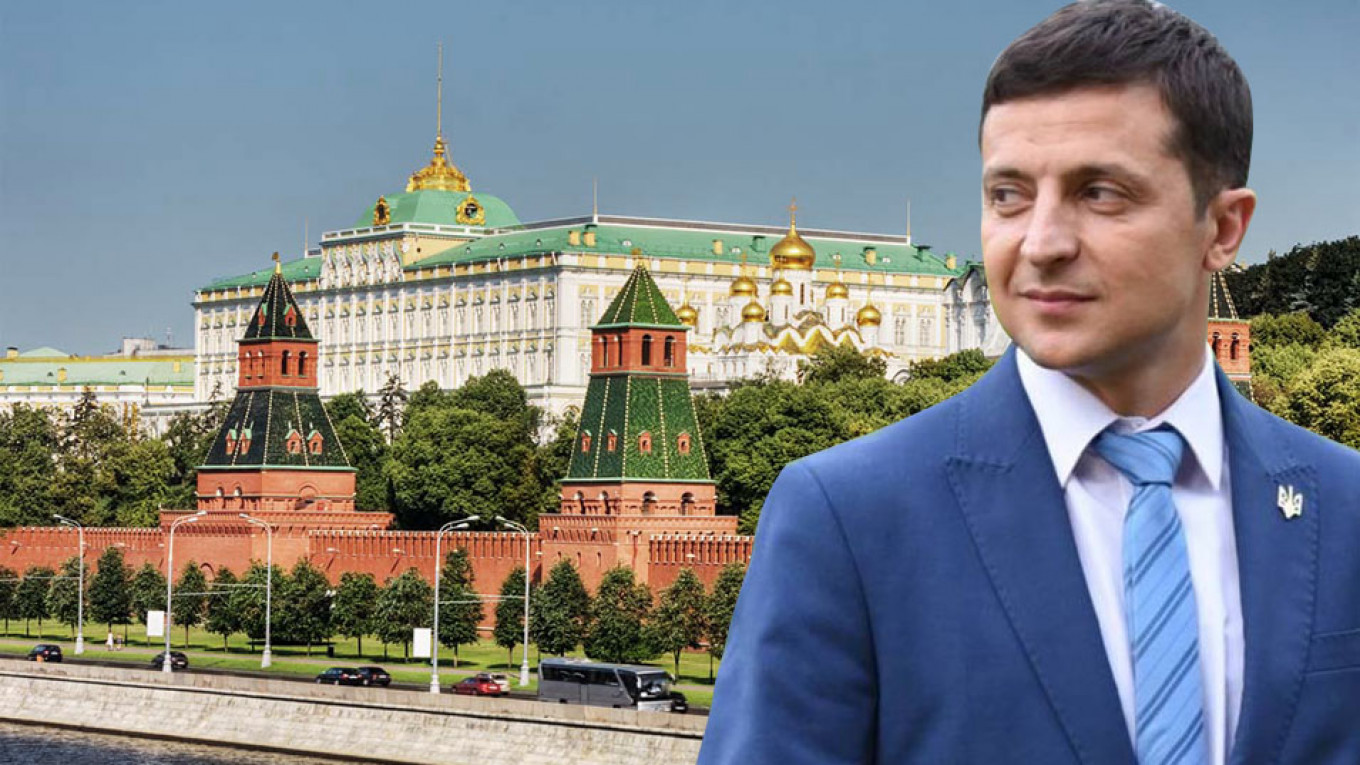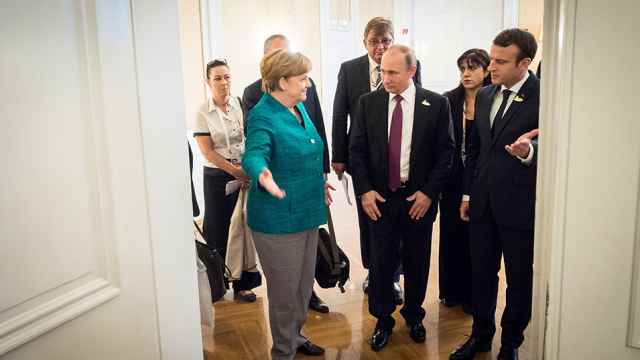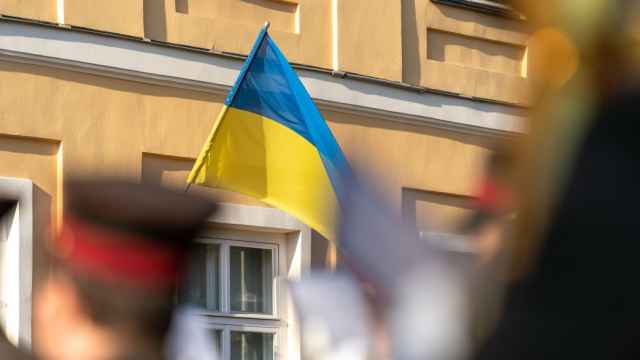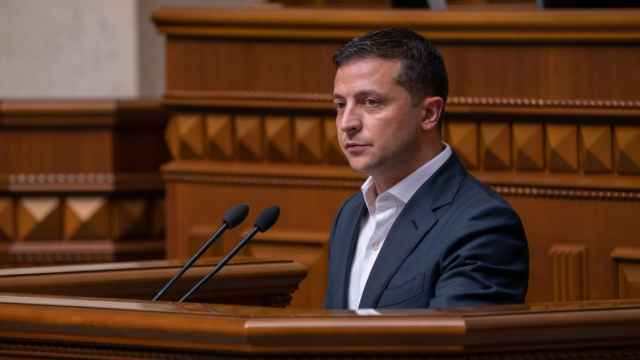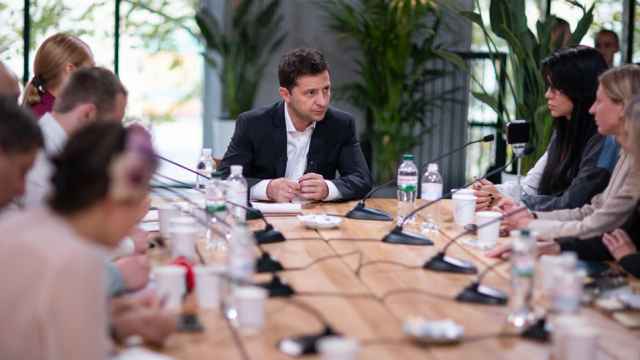Volodymyr Zelenskiy is the new president-elect of Ukraine. This is a fresh political reality for both Ukraine as well as Russia, where the presidential elections in its neighboring country garnered perhaps greater attention than those at home in Russia last year.
Generally speaking, Moscow will be satisfied with the outcome of the Ukrainian elections.
Its main hope — "Anyone but Poroshenko" — came to pass. What's more, it did so without any particular effort from the Kremlin except for pointedly cutting off contact with Petro Poroshenko after the Kerch Strait incident (which derailed the meeting between Putin and Trump in Buenos Aires).
The Kremlin did not predict Zelenskiy's victory; it worked on diminishing Poroshenko's position (to later highlight the failure of his tough ethno-nationalist agenda and fixation on confrontation with Russia), and, if possible, seeing the relatively pro-Russia candidate Yuriy Boyko (backed by outright pro-Russia Viktor Medvedchuk) make it through to the second round.
A second round for Boyko would have created ideal conditions for the South-east's new party, Opposition Platform — For Life, to enjoy success in the parliamentary elections in Autumn, which could have been followed up by a possible coalition that would have put Medvedchuk in the VR speaker's chair, and made Boyko and his "comrades" a significant part of the Cabinet of Ministers of Ukraine.
Although these plans did not come to pass, Boyko commanded a decent result and, according to the latest poll by the Kiev International Institute of Sociology (KIIS), his and Medvedchuk's party can claim second place with approximately 16 percent of the vote (with first place as yet held by Zelenskiy’s party, Servant of the People, with 26 percent, and Poroshenko's bloc coming in third with 14 percent).
In Ukrainian politics, Russia is still in the game.
Moscow may be greatly tempted to see Zelenskiy's impressive result, primarily in the South-east, as the electorate's demand for a new approach to relations with Russia.
There is some truth to be found here: the Ukrainian electorate indeed did not express a desire for war with Russia, but neither did they express a desire for peace on Russian terms.
According to the latest KIIS poll about the upcoming president's first 100 days, 39 percent expect a reduction in utility rates, 35 percent expect bills on lifting immunity from deputies, judges and the president, and 32 percent expect an investigation into high-profile corruption cases.
According to the llko Kucheriv Democratic Initiatives Foundation, 57 percent of Zelenskiy voters support Ukraine joining the EU, and 37 percent are pro joining NATO. The second greatest "geopolitical demand" is neutrality (37 percent) and that Ukraine refrains from membership in any integration associations (30 percent) i.e. that Ukraine maintains international subjectivity, which was so clearly captured by Zelensky in the series, Servant of the People.
This is generally good news for Moscow: there will be less hysteria and greater chance of negotiation.
However, it also presents bad news: it will be impossible to steamroll Zelenskiy, the comedian-turned-president, to suit Russian terms.
Perhaps, it is more accurate to read Zelenskiy’s electoral mandate as a demand to completely dismantle state capture, oust those that had appropriated the state institutions of the corrupt elite, bring about true equality of all citizens before the law, and abolish privileges. It is more reminiscent of the 2014 Maidan agenda, a follow-through of the anti-elite revolution that was halted and sabotaged by the current government.
What is important for us is whether Zelenskiy's election will lead to an improvement or deterioration in Russian-Ukrainian relations. At the very least, Zelenskiy will divest himself of Poroshenko’s toxic baggage in terms of relations with Moscow, although the latter always upheld secret communication channels with the Kremlin by way of Viktor Medvedchuk.
This creates a particular window of opportunity, which would not exist should Poroshenko have been re-elected. Moscow has no intention of slamming this window shut before it becomes clear what winds will blow through it.
At the recent Assembly of the Council for Foreign and Defence Policy, Sergey Lavrov rebuffed certain "vehement social activists" demanding non-recognition of the Ukrainian election results. Moscow will simply accept and take heed of the election results and will continue to monitor the signals given by the new leadership in Kiev.
From what Zelensky publicly touched upon during his campaign, we can thus far conclude there is potential for a step-down in aggressive rhetoric and the establishment of a more relaxed atmosphere for the discussion of, for example, normalizing transport links (reinstating direct flights, and cargo transit), lifting certain sanctions, and access to certain markets.
To a large extent, this would duplicate the example of the successful post-war normalization of relations with Georgia.
Needless to say, a return to the pre-2014 days and the "brotherly relations" between Russia and Ukraine is out of the question.
Zelenskiy will not be able to recognize Russian sovereignty over the Crimea (although he did declare that Crimea has de facto been lost to Ukraine and he has no intention of fighting Russia over it).
Zelenskiy has also called for lifting the artificial restrictions on the use of the Russian language in Ukraine (which includes lifting the ban on access to Russian social networks and the restriction on cultural exchanges).
Should these steps be taken, it will go some way to breaking the ice and will be duly appreciated by the Kremlin. Moscow will probably agree to the release of the Ukrainian sailors arrested during the Kerch Strait incident, most likely, by way of a lenient sentence or in the form of a benevolent presidential order (which in itself would also remove the American stoppage on holding another meeting between Putin and Trump).
But this positive agenda comes with limitations. It is inevitably contingent on progress being made on the Donbass situation and would collapse again should irreconcilable differences arise around implementing the Minsk agreements.
Based on what Zelenskiy said about the Donbass, it is clear that he has only a vague understanding of the details of the agreement.
Indications that there could be a direct dialogue between the leaders of the republics quickly reverted to a familiar tack: talks with Moscow should take place in the presence of Western mediators, and the Normandy format should be remodeled to include the United States and Great Britain in a "Budapest style format".
This, albeit possibly well-intentioned stupidity, signals to Moscow that it is fair to expect that Zelenskiy will attempt to reject agreements that have already been reached, which in itself may provoke a crisis.
Going forward, the head spokesperson of Zelenskiy's election headquarters, Dmitry Razumkov, confirmed that Zelenskiy's adherence to the Minsk negotiation process is untenable ("all the anti-Russia sanctions are linked to it"), but made it clear that Zelenskiy would not implement the Minsk agreements as interpreted by Russia:
"The return of the occupied territories of the Donbass and Crimea must proceed exclusively on Ukraine's terms. Russia, as always, is trying to turn everything on its head and do everything backwards — by holding elections first. You can call it whatever you like, but it is simply not possible to pursue a democratic process in the occupied territory right now."
In all likelihood, Zelenskiy will not implement the Paris summit agreement reached by the Normandy Four on achieving the "Steinmeier formula" i.e. holding elections in the republics under a special law and granting the DLNR special status on a temporary basis on the day the elections are held, and then on a permanent basis after the OSCE can confirm the integrity of the elections.
Zelenskiy's team continues to reject a tight schedule for the implementation of the Minsk agreements (Moscow would like it to coincide with the local elections in Ukraine in the autumn of 2020).
Based on what Zelenskiy said about the Donbass, it is clear that he has only a vague understanding of the details of the agreement.
Moscow has further reason to not be too optimistic owing to Razumkov’s statement that "European and Euro-Atlantic integration is Ukraine's civilizational choice, confirmed by the death toll on the Maidan in 2014, and there is simply no alternative to Ukraine’s accession to NATO."
For now, Moscow is prepared to write all this off as pre-election rhetoric.
"Fulfilling the Minsk agreements and resolving this problem is our direct interest," Sergey Lavrov said at the Assembly of the Council for Foreign and Defence Policy. "We achieved a great feat securing Minsk II in the UN Security Council resolution."
The "full Minsk II" is still a win-win situation for Russia even if the agreement is not implemented. The implementation of Minsk II allows Russia to maintain influence and achieve its goals in Ukraine by peaceful means.
Moscow has no reason to reject Minsk II, especially since neither Kiev nor the West are putting forward any new "big deals" that could theoretically make it more attractive for Russia to "exchange the Donbass for Crimea and Ukraine’s neutrality."
To reject Minsk II with little or no reason would come across as a personal foreign policy defeat for Vladimir Putin.
A Russian version of this article was originally published in Republic.
A Message from The Moscow Times:
Dear readers,
We are facing unprecedented challenges. Russia's Prosecutor General's Office has designated The Moscow Times as an "undesirable" organization, criminalizing our work and putting our staff at risk of prosecution. This follows our earlier unjust labeling as a "foreign agent."
These actions are direct attempts to silence independent journalism in Russia. The authorities claim our work "discredits the decisions of the Russian leadership." We see things differently: we strive to provide accurate, unbiased reporting on Russia.
We, the journalists of The Moscow Times, refuse to be silenced. But to continue our work, we need your help.
Your support, no matter how small, makes a world of difference. If you can, please support us monthly starting from just $2. It's quick to set up, and every contribution makes a significant impact.
By supporting The Moscow Times, you're defending open, independent journalism in the face of repression. Thank you for standing with us.
Remind me later.



